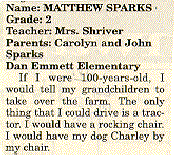
A child's life on the farm is full of activities like 4-H and Future Farmers of America, as well as the typical childhood activities of bike riding, playing make-believe and sports. When asked what it is like to grow up on a farm, Josh Shinaberry, of a Fredericktown sheep and beef farm says, "It's kind of fun, sometimes. . . well, when you get to run around and play. And when you're up in the hay mow, sometimes, except for when you have to throw down the hay and do chores. . . . When you're driving the tractor you usually have fun. . . and when you're driving the three-wheeler."
 While the farm is a place of exploration, the children are taught that
the farm can be a very dangerous place, too. Farm kids learn to stay away from
heavy machinery, like feed-grinders and tractors, and other pieces of
equipment that have power take-off and/or blades. The children make a gradual progression from
jobs like helping in the family garden and helping to feed the animals to harder chores
like milking the cows and perhaps completely assuming a certain task when they are older.
While the farm is a place of exploration, the children are taught that
the farm can be a very dangerous place, too. Farm kids learn to stay away from
heavy machinery, like feed-grinders and tractors, and other pieces of
equipment that have power take-off and/or blades. The children make a gradual progression from
jobs like helping in the family garden and helping to feed the animals to harder chores
like milking the cows and perhaps completely assuming a certain task when they are older.
Cindy Grassbaugh, who lives on a Howard dairy farm, thinks that she learned how to "give and take" from farming and from being involved in farming organizations. "You learn that when something needs to be done you do it as best you can. You have to take responsibility." Cindy says that while 4-H and FFA taught her to work hard and to take her responsibilities seriously. She also had a lot of fun and gained valuable skills that will help her in her adult life. "Through the FFA I have had the opportunity to travel all over the place. I have been to Georgia, Kansas City, Missouri to the National FFA Convention, Massachusetts and the National Leadership Conference with the state officers in Kentucky." She also credits these groups with allowing her to meet new people and giving her a chance to do some public speaking.
Travel opportunities are very important to farm kids. Especially on a dairy farm like Cindy's, family vacations are rare and trips to far away places like Georgia or Massachusetts are even rarer. Becky Shinaberry, Josh's mother, remarks that "a farm does not allow for vacation time"---at least not in the way that urban and suburban families take vacations. Like many farmers, the Shinaberry's take short trips and go camping or visit with relatives. "A vacation for me is at least one night away from the farm," Becky says. Growing up on a farm and being involved in farm organizations allows children to understand plant, human and animal relationships, develop a sense of responsibility and gain skills and experiences that will help them even if they do not chose to become farmers. Cindy Grassbaugh concludes, "People hear me complain about the 365 days a year thing. But it has given me a lot of opportunties---golden opportunities."
The Family Farm Project would love to hear about your experiences
growing up on a farm. What do you (or your children)
enjoy doing on the farm?
To tell us about your farm, click on the cow. . .



 E-Mail The Family Farm Project
E-Mail The Family Farm Project